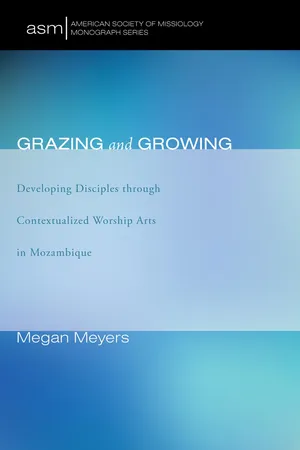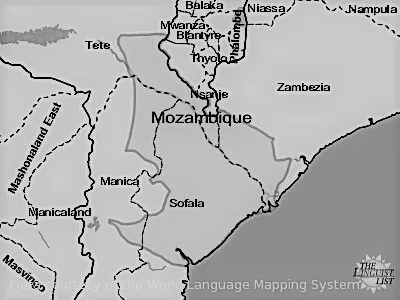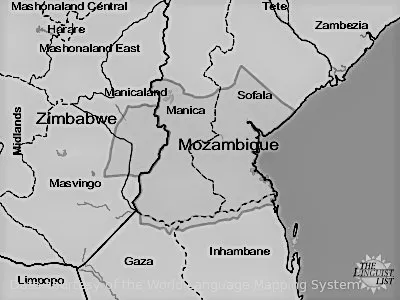![]()
Part One
The Landscape: Exploring Mozambican Music-Culture Values
Part one situates the research by describing the landscape of this study, the unique features and distinctive elements that have shaped worship praxis in Mozambican evangelical churches. It begins with chapter 1, “Mozambique’s Musical Context: Multicultural Migration and Missions,” relating the general context in which Beira churches reside. Chapter 2, “The Literary Lay of the Land,” details my guiding theoretical framework, positioning this study within the extant literature. Chapter 3, “Forming the Fence: Research Design and Method Review,” describes the research process I used to discover the present state of local church contexts and their worship praxis in Beira, Mozambique.
![]()
1
Mozambique’s Musical Context: Multicultural Migration and Missions
At 9:25 a bell rings, calling the faithful to enter the church and be seated. A pastor hands me a hymnal. The youth choir begins to sing a capella, reverently filling the air with a sense of expectation. Congregants sit quietly, some with eyes closed, preparing their hearts for an encounter with God. The service leader stands and solemnly declares, “Let’s pray.” The doors to the church are shut as we all bow our heads for prayer.
If you were to listen to the city of Beira, Mozambique on a Sunday morning, you would hear an assortment of sounds, beating batuques, clapping hands, strumming guitars, dancing feet, and singing voices, all raised in resonant celebration. Music serves as a marker, an audible clue that can lead to the discovery of the complex history and dynamic religious and cultural interactions that have formed the sonic-scape of today’s urban worship context in Mozambique.
Context
“Ungakhonda dziwa kudabuluka iwe, nkhabe dziwa kunenda iwe” (If you don’t know where you come from, you won’t know where you are going).
Unlike some isolated cultural groups in Africa, the peoples of Mozambique have been multicultural and linked to the broader global marketplace for centuries. “From Bantu-speaking farmers and fishers to Arabic traders, Goan merchants and adventuring Europeans, Mozambique has long been a crossroads of cultures.” This dialectic between diverse cultures (and religions), due in large part to its geographic location on the Indian Ocean, has indelibly marked the land and its people.
Not only is Mozambique defined by its coastland, but also by its rivers that trisect the country into vastly different sociopolitical and historical zones. The city of Beira, in the province of Sofala, lies at the heart of the central region, demarcated by the River Save in the south, and the River Zambezi to the north. As Mozambique’s third largest city (boasting a population of 546,000 according to the 2007 census), Beira has historic significance as a land bridge connecting the African interior to the global marketplace. As it is the port city for the major sources of economic wealth in Mozambique as well as for neighboring land-locked countries, Beira remains a pivotal nexus for the nation.
Figure 1: Aerial View of Beira (Wikimedia Commons)
Contested Cultural Claims to the City
“They don’t like us because they say we aren’t from here . . . but neither are they!”
The modern city of Beira was founded in 1884 near the mouth of the Pungue River as a base of operations for Joaquim Carlos Paiva de Andrade, a wealthy prazero (plantation owner). The city’s location in a no-man’s land of alluvial swampland forced Beira’s founders to employ workers from the surrounding hinterlands for house construction and domestic work. These employees were drawn primarily from two language groups, Sena and Ndau (see figures 2a and 2b below), continuing to live in linguistically divided bairros (neighborhoods) on the town’s outskirts.
Figures 2a and 2b: Sena and Ndau Language Maps (multitree.org)
Sena and Ndau share many traditional cultural traits, but urban migration in the late 1800s and resultant linguistic interaction between these language groups formed unique cultural characteristics. Unlike other Mozambican cities, Beira does not have a distinctive mono-linguistic cultural identity, and people are usually reticent to greet a stranger in dialect, as one never knows who is Sena or Ndau. This hesitancy is so pronounced, it has been said that the mother tongue of Beirenses (habitants of Beira) is Portuguese. Though this view is not entirely correct, there are many inhabitants for whom this is true, and indicative of a cultural identity widely influenced by the surrounding global reality.
An example of this hybrid uniqueness is an emerging language, jokingly called “Mabangue,” by youth, a type of pidgin that is spoken in Beira. It is an amalgamation of Portuguese, English, Sena, and Ndau with expressions such as “vamos jobar” (let’s go to work; Portuguese “let’s go,” English “job” with a Portuguese “ar” verb ending). Creative solutions for communication and survival, illustrated primarily through the art forms of music and dance are just some of the elusive distinctives of Beira’s complex cultural characteristics.
Influence of Foreign Missions on Local Worship Praxis
“The missionaries said our music called the devil!”
Beirenses encounter not only a multiplicity of languages, but also a plurality of religious traditions. Mozambican authorities estimate that there are currently more than thee hundred registered Christian denominations operating throughout the country today, including the Roman Catholic church, mainline Protestant churches, Evangelical churches, African-...



